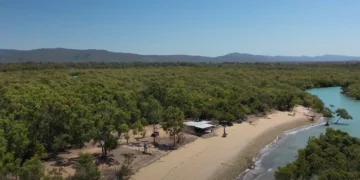A large slice of tropical paradise bordering the Coral Sea has become one of the first properties in regional Queensland to be put up for sale for cryptocurrency.
Aquila Cove, 100km south of Mackay, has been owned by the same family for generations and recently hit the market for 30 bitcoin or 440 ethereum.
John De Costa, the owner of the 162-acre block of land, said he had been trying to sell the place on and off for five years for $2.2 million.
At the present market rate, 30 bitcoins are equivalent to about $2,040,013.
“We had people come a couple of weeks ago and look at it specifically because they hold bitcoin, and they believe in the bitcoin philosophy.
“They were looking for a property that offered them and their families a refuge from the world of COVID.”
Mr De Costa is an account manager for a rural supply company, and it was his son who introduced him to the world of cryptocurrency.
Last January, he said his son “got lucky”, investing a few thousand of his savings into bitcoin when it crashed, which over the course of the next month tripled in value.
“He explained it to us, and we sort of agree with the philosophy of cryptocurrencies, and bitcoin in particular,” Mr De Costa said.
A first for regional Queensland
Antonia Mercorella, the chief executive of the Real Estate Institute of Queensland, said this was probably the first time she had seen a regional Queensland property being offered for sale in this way.
Ms Mercorella said the infrastructure in place for property transactions was clearly based on Australian dollars.
“I don’t think any of those processes are set up in a way to recognise bitcoin,” she said.
“I would think that a prudent real estate practitioner if they’re being asked to market a property in this way, you would be telling your vendor to seek legal advice about that.”
Mr De Costa said he realised the use of crypto was not very common or widely understood in Australia, but he believed it was gaining momentum.
“Around the world, there’s been a lot of bitcoin sales,” he said.
Mr De Costa said he suspected by using bitcoin, he would be able to attract an international buyer.
“For them to transfer bitcoin to me is a simple, low-cost, almost no-cost operation,” he said.
“The actual transferring of the money is just instantaneous, and there are no third parties involved.
“Whereas for them to convert their currencies to Aussie dollars and pay all the fees and charges the bank is going to charge the transfer of that amount of money, there’s that logistics advantage as well.”
But like any sale, this one will involve negotiation.
“If the price of bitcoin drops to $20,000, well obviously, our bitcoin price will have to go up,” he said.
What is bitcoin?
Bitcoin is a digital method of decentralised payment where transactions are not verified by a central bank or authority, rather by a blockchain.
They are stored in a digital wallet, and there is also a limited supply.
University of Queensland Business School’s Dr Christoph Breidbach said a digital wallet was essentially like an app on your phone.
“It has a unique identifier, the public key, and then there’s also a private key,” he said.
“With the keys, you can control the transfer of digital currency from one wallet to another.”
Dr Breidbach said there was still a lot of novelty to transactions facilitated with cryptocurrency.
“That means in a way you hedge yourself against inflation.”
Dr Breidbach said one of the benefits of putting a property on the market for bitcoin was the publicity it generated.
“If I ever sell property, I might do it myself,” Dr Breidbach said.
He said the owner was fundamentally banking on the idea that the price of bitcoin would continue to increase. If that were the case, they would get a significantly greater monetary return than selling for Australian dollars.
How does the transaction work?
A record of the transaction is kept on the blockchain.
Dr Breidbach said to the best of his knowledge, there were no legal restraints on selling a property for bitcoin.
“I mean, if you own a house, you could sell it for cocoa beans if you wanted to, or you could trade it against a grain,” he said.
Can the government regulate the unregulated?
Last week, the federal government announced plans to investigate a custody regime to protect consumers who trade in cryptocurrency.
Dr Breidbach said conversations around decentralised finance were really about making the current financial system obsolete.
He said what may happen is the introduction of central bank-issued digital currencies.
This is something Treasurer Josh Frydenberg hinted at this week.
“That would essentially mean a centralised digital currency run by a government, and that, of course, creates a whole bunch of issues and challenges,” Dr Breidbach said.
“I hope we’re not going to go down that road.”




